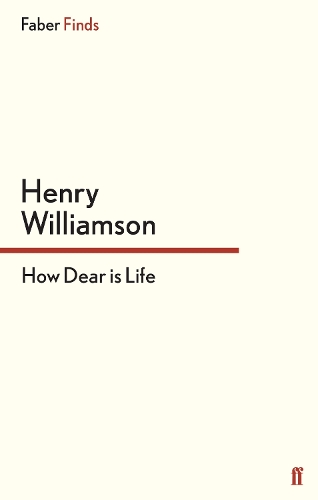
How Dear Is Life
(Paperback, Main)
Publishing Details
How Dear Is Life
By (Author) Henry Williamson
Faber & Faber
Faber & Faber
19th August 2010
Main
United Kingdom
Classifications
General
Fiction
Physical Properties
Paperback
336
Width 126mm, Height 198mm, Spine 25mm
360g
Description
The fourth volume of A Chronicle of Ancient Sunlight, How Dear is Life follows the story of Phillip Maddison in the portentous months leading to the outbreak of the Great War in 1914.Now a clerk in the Moon Fire Office in London, Phillip decides to join the territorials , attracted by the money, by the camp near the sea, by the prospect of a new suit of clothes. As the last glorious summer slips away war seems unreal, but the old world is shortly to fall to pieces, never to return, as the British Expeditionary Force sets sail for France. fifteen volumes. Although it should be much better known, it has attracted high praise most especially from George D. Painter (the biographer of Proust) and John Middleton Muury. thread leading to the mystery - monster or divinity - at the centre. In my belief . . . the whole cycle will ultimately be recognized as the great historical novel of our time, its subject as the total experience of twentieth-century man.' George D. Painter most remarkable English novels of our time . . . It is amazingly rich in all the living detail of a swiftly changing society; the characters are drawn with such loving sympathy and such firmness of imaginative outline that we are entirely absorbed by their vicissitudes. We are apprehensive for them, we are relieved; we rejoice and are sorrowful; we are angry and we understand and we laugh and laugh again. To e able to do this with us is the novelist's supreme gift . . . I believe it is high time we awoke to the splendour and scope of his effort and achievement in A Chronicle of Ancient Sunlight. Begin with the Dark Lantern and read on; you will be the richer for it.' John Middleton Murry reissued in Faber Finds.
Author Bio
Henry Williamson (1895-1977) was a prolific writer best known for Tarka the Otter which won the Hawthornden Prize in 1927. He wrote much of else of quality including The Wet Flanders Plain, The Flax of Dream tetralogy and the fifteen volume A Chronicle of Ancient Sunlight all of which are being reissued in Faber Finds. His politics were unfortunate, naively and misguidedly right-wing. In truth, he was a Romantic. The critic George Painter famously said of him, 'He stands at the end of the line of Blake, Shelley and Jefferies: he is last classic and the last romantic.'
